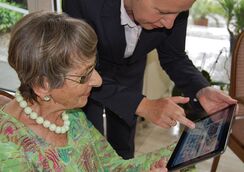By, Lisa M. O'Neill, DBH, MPH A person living with dementia can experience pain, just like anyone else. Dementia does not cause pain, but a person living with dementia can be at risk for other things that cause pain such as falls or other injuries. Further, as with most older adults, people with dementia are more likely to have other medical conditions that might cause pain. However, it might be difficult for them to understand what you are asking or what they are feeling, so they may not be able to tell you if something hurts. Pain can come from multiple sources. It can be temporary, like a headache or sore throat. It can be longer lasting, like a sprained wrist or ankle. It can also be ongoing and persistent, like lower back or nerve pain. The source can also be symptoms of a known or new disease, or the treatment of a disease such as cancer. It’s normal for caregivers to feel frustrated when trying to communicate with a person living with dementia. This frustration can be compounded with stress and anxiety when asking an important question like “are you in any pain?” Tips for Assessing PainBefore discussing something important, like pain, try to take the mood of the person with dementia into account, and if possible, have the conversation when they are feeling calm. However, if that is not possible, try to reduce any distracting noise. Use gestures to indicate you would like them to sit down next to you and make eye contact with them. Touch their hand or arm to try to hold their attention. Start the conversation with simple words using a clear, slow, low, and pleasant tone of voice. Be patient. Learn to be comfortable with silence as your loved one tries to decipher the question and come up with the answer. It’s ok to suggest words, but don’t rush them if possible. If they don’t answer, it’s ok to ask the question again. Many experts suggest using the same words two times but consider using other words if after several minutes you need to ask the question a third time. In the early stages of dementia, a person might be able to answer the question “does this hurt?” while you are touching or pointing to a body area, or “can you show me where it hurts?” They also might be able to provide yes/no answers to questions like “are you in any pain?” Visual cues can be helpful with clarifying the question and guiding their answer. One handy tool is the FACES Pain Rating Scale shown below. The person can point to the ‘face’ that expresses their level of pain. Looking for Signs of PainAs a person’s dementia gets worse, they probably won’t be able to tell you if they are in pain, and you will need to watch for behavior and physical cues. “I’m in pain” signs can include:
Develop a Pain Management PlanIt’s important to discuss any concerns of pain with the health care team, and work with them to develop a pain management plan. Be sure to report if you notice the person appears to be in pain more than usual. The health care team might need to run some tests to find out why. Once a plan is developed, try to always have pain medications on hand so you can treat the pain as soon as possible. Use the medication as prescribed. Don’t increase the dose – even if you are worried – unless a health care provider says its ok. To determine if pain medication is working, the above FACES Pain Rating Scale can be used again. If the “I’m in pain” behaviors improve, the pain is probably getting better too. Caregiving and health care teams can also work together to discuss and incorporate some non-drug pain management practices into the person’s daily routine. It is extremely important to consider the person’s overall physical, mental, and financial wellbeing before considering any new activity, including their fall risk, level of fitness, and environment. Some non-drug pain management activities include light exercise, relaxation training, biofeedback, and therapies such as music, dance, and massage. Pain should be assessed on a regular basis and treatments should be adjusted as needed. Untreated pain can reduce a person’s quality of life, and lead to poor health outcomes. It can interfere with daily activities, lead to reduced mobility, depression, or aggressive behavior. Unrecognized pain can lead to inappropriate medication prescriptions such as antidepressants or antipsychotics. Families should consider adding a palliative care specialist to the health care team. Palliative care services can ensure effective pain control strategies are put in place and can be provided at any stage of dementia – not just the later stages. Want to Learn More?
About the Author Dr. O’Neill is the Associate Director of Education and Policy at the University of Arizona Center on Aging and Clinical Assistant Professor for the University of Arizona College of Medicine, Division of Geriatrics, General Internal Medicine and Palliative Medicine. Her educational background includes a Doctor of Behavioral Health from Arizona State University, and a Master of Public Health from the University of Arizona. Dr. O’Neill is an appointed member of the Governor’s Advisory Council on Aging (Chair, 2017-2021), a member of Arizona Senator Mark Kelly’s Senior Citizen Advisory Group, and board member for the Arizona Caregiver Coalition. She also serves on several state and regional workgroups including the Attorney General’s Task Force Against Senior Abuse and Arizona’s End of Life Care Partnership. In 2015, Dr. O’Neill was named Gerontologist of the Year by the Arizona Geriatrics Society, and she is a 2019-2020 Health and Aging Policy Fellow.
1 Comment
Nicole Ruggiano
6/12/2022 12:41:09 pm
Thank you for this information, Dr. O'Neill! This is a big challenge for caregivers! One caregiver we interviewed said that her father had started becoming highly agitated for a couple weeks, which was not usual for him. Then, they found out he had an issue with his foot that was causing him pain and he wasn't able to express that to them. Once they had the foot issue resolved, the agitation went away. It really shows how complicated caring for someone with dementia can be. You have many useful tips here that caregivers will find helpful!
Reply
Leave a Reply. |
Caregiving 101The Caregiving 101 is a resource for caregivers in Alabama who want to learn more about caregiving and dementia. Archives
August 2023
What would you like to learn more about?
All
|
205-348-4654


 RSS Feed
RSS Feed
